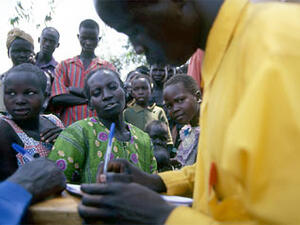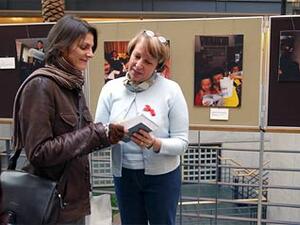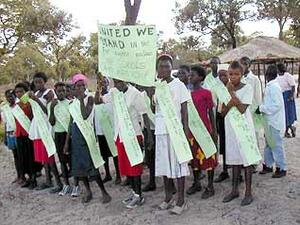We can't afford to ignore secondary education for refugees, say experts
We can't afford to ignore secondary education for refugees, say experts

Angolan refugees attending school in Nangweshi camp, Zambia.
GENEVA, September 19 (UNHCR) - Lamenting the lack of adequate post-primary schooling for refugees, UN refugee agency chief Ruud Lubbers has called for more efforts to bridge the gap between emergency and development aid to ensure education for more than 1.5 million refugees of secondary school age.
"We must overcome the gap between emergency and development aid," said Lubbers on Wednesday, in a speech delivered on his behalf by the Deputy UN High Commissioner for Refugees, Mary Anne Wyrsch, at the opening of a symposium in Geneva on post-primary education for refugees. "At present post-primary education for refugees is a casualty of this gap. We must find a solution for this."
In the two-day symposium organised by the Refugee Education Trust (RET), more than 80 education specialists from 18 different countries met to discuss ways of expanding secondary schooling for more than 1.5 million teenage refugees. RET was set up in May 2001 by former UNHCR chief Sadako Ogata to improve post-primary education for refugees as a legacy of the refugee agency's 50th anniversary.
According to RET, some 50,000 teenage refugees are in secondary school - a mere three per cent of the 1.5 million refugees of secondary school-going age.
"We know that education gives refugees self-esteem and dignity, and the chance to solve their own problems, defend their rights and become self-reliant school," noted Lubbers in his statement. "But because of limited funding and competing needs, UNHCR offices often find themselves unable to dedicate adequate funds to education."
This year, the UN refugee agency has set aside $38 million for education. But most of its efforts and resources go to primary education.
In a written message to participants of the symposium, Ogata, Founding President of RET, said that she was saddened by the fact that UNHCR had too little funds to guarantee secondary education for many refugees. At the same time, she appreciated the need for refugees to continue their education beyond primary level.
"During my time as UN High Commissioner for Refugees, I visited many refugee camps all over the world," said the brief message from Ogata. "I could see that the refugees themselves placed a very high value on education because they invariably asked me to help their children go to school. I was saddened by the fact that UNHCR had too little funds to guarantee secondary education for many refugees."
Explaining the raison d'être of RET, she added, "Consultations within and outside UNHCR made it clear that there was an urgent need for an independent organisation that would focus on quality post-primary education to the largest number of refugee children."
At present, more than 22,000 refugees in Pakistan, Tanzania, Guinea, Sierra Leone and Uganda are in secondary school with RET sponsorship. The trust has constructed and furnished school buildings, provided educational materials, trained and paid teachers, promoted health education, encouraged girls' participation and provided vocational skills training.
In her statement at the opening of the symposium, Her Royal Highness Princess Maha Chakri Sirindhorn of Thailand, a member of the RET board, said that post-primary education is not a question of "Can we afford to do it?" but rather one of "Can we afford not to do it?"
She said developing countries had limited resources for the specialisation required in secondary schools. While these problems exist in regular schools, she added, they are substantially more serious among refugees seeking secondary education.
"The high degree of specialisation required at this level means that recruiting and retaining qualified teachers in specialised fields such as computers, mathematics, science, technology and languages is very difficult," she said. Curricula, laboratories, appropriate facilities and up-to-date teaching materials are both rare and expensive, she added.
What seems to be a successful model in deprived areas, noted Princess Maha Chakri Sirindhorn, is the delivery of post-primary education together with vocational training, which she said could be achieved to a considerable degree despite all the obstacles.
Representatives from the governments of Burundi, Canada, Colombia, the Democratic Republic of the Congo, France, Italy, Norway, Sweden, Tanzania, Thailand, Mexico and the United States also attended the symposium that ended on Thursday.






